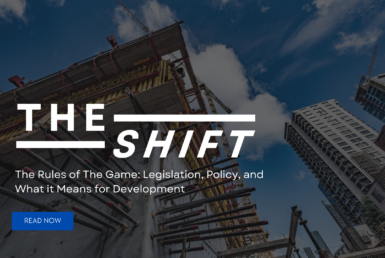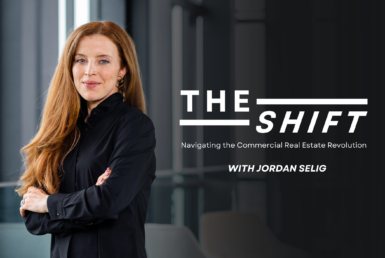Seattle’s Commercial Market Is Poised For Rebound

Seattle has historically been a strong commercial market for development and occupancy due to its port location, high population density, employment opportunities, and business culture. However, there’s no denying that the COVID-19 pandemic brought a dramatic halt to the growth and development of the region, expanding stagnation to markets across the entire globe. What began as a global health crisis quickly transformed to an equally damaging economic crisis. Businesses of all sizes struggled to maintain operations and adapt to the changing environment. Despite the bleak outlook of 2020, Martin Selig Real Estate remained doggedly optimistic about the future of the Seattle real estate market, as noted in this Puget Sound Business Journal article from December 2020 and a subsequent 2021 blog post update. That optimism is now spreading as 2021 continues to unfold, with leading economic and business indicators now on positive upward trends. It seems the Seattle commercial market is poised for a rebound.
As the pandemic raced through Washington state in mid-2020, Governor Inslee and local officials passed down unprecedented quarantine and social distancing orders to slow the spread of the virus. When physical business operations cut hours or closed altogether, many homes and apartments turned into remote offices. This shift resulted in plummeting demand for commercial office space in 2020. Colliers International’s Puget Sound Office Market Report noted that in Q3 2020, key areas of Seattle “saw a combined 657,000 square feet of move-outs, many of which were smaller businesses”. At the same time, new construction and developments halted on commercial projects due to government restrictions, tenant exits, worker shortages, and a rising cost of materials. The Architectural Billings Index (ABI), which is a 9-12 month leading indicator of commercial construction work and general market conditions, fell to an all-time low in April 2020. Subsequently, consumer personal consumption expenditures (PCE) also fell to historical lows as employment stability suffered, options for spending declined, and economic drawbacks trickled down.
But the despair of 2020 is giving way to a sense of hope and recovery in 2021. Vaccination data as of July 7 2021 indicates that 48.2% of Americans are fully vaccinated, while another 7.6% have received their first of two doses. In Washington state, 55.5% of the 7.4 million population is now fully vaccinated. With vaccinations rising and daily COVID cases in decline, consumer confidence is returning. According to Deloitte’s consumer survey research, the end of May saw 48% of consumers concerned about their health and well-being, one of the lowest figures since the survey first began in April last year. Fast forward to today, Deloitte reports that “with lessening anxiety has come a change in mood: Americans are eager to get back to meeting each other, head to their favorite restaurants and pubs, go for vacations, and return to their offices”. Indeed in that same survey, 68% of respondents said that they feel safe to return to their workplaces, the highest figure reported since the beginning of the publication.
With consumer confidence on the rise again and public health restrictions loosening, employers are optimistic about bringing workforces back to commercial office spaces. Large employers such as Facebook, Google and Amazon have recently announced full- or part-time in-office policies for fall 2021. Other commercial tenants are following suit and calling for employees to return to office in at least a limited capacity within the foreseeable future. Already, Colliers is reporting that the Seattle sublease market lost a total of 307,000 square feet in the last two months. This reduction in sublease space and the concurrent robust proposal activity on remaining space is another indication that the market is in recovery.
This will favorably impact new construction as well. Within the Seattle market, the Downtown Seattle Association’s 2021 Economic Development Report highlights that “Seattle remains one of the top markets in the nation for new construction, once again outpacing all other U.S. cities in Rider Levett Bucknall’s crane index (July 2020)”. ConstructionDive.com reports that the Associated Builders and Contractors (ABC) Construction Confidence Index, which measures contractors’ expectations for sales, profit margins and staffing levels over the next six months, has also seen a sharp rebound in 2021.
Seattle is poised for not only recovery but also growth. According to the 2020 International Downtown Association Vitality Index, downtown Seattle scored high marks for its economy and vibrancy, on par with New York City and San Francisco. The growth of Seattle lab and tech sectors as well as the area’s diverse and educated workforce will surely continue to benefit from Seattle’s advantages over other cities in the years ahead. While slipping in ranking compared to previous years for overall real estate prospects, Seattle made the cut for Emerging Trends’s 2021 ‘18-hour cities’ that are ‘popular in-migration destinations due to lifestyle, culture, and employment opportunities’ ‘. The Colliers report also concluded optimistically, “future demand looks bright for the Puget Sound, as the fundamentals leading to its growth have not changed”.
At MSRE, we remain bullish on the future of downtown Seattle and we’re ready to meet the challenges and needs of a returning workforce. See our properties page for more information on currently available office space, and our new development page for more information on current construction projects.




